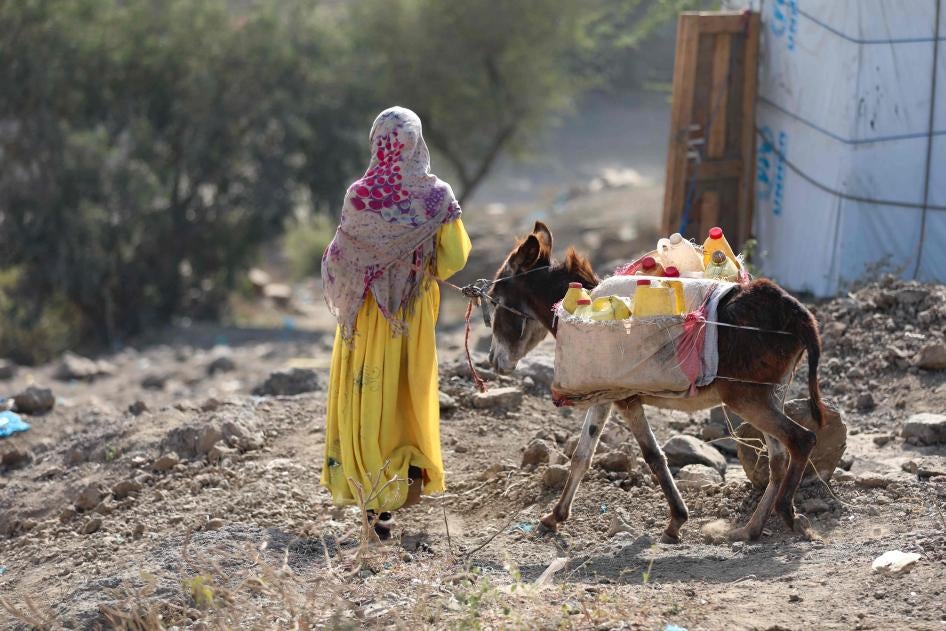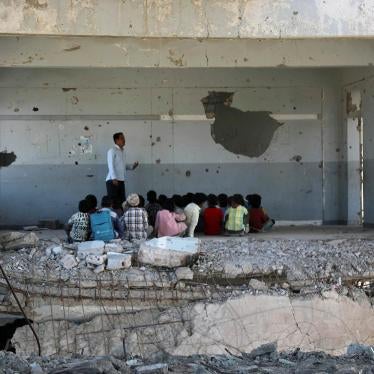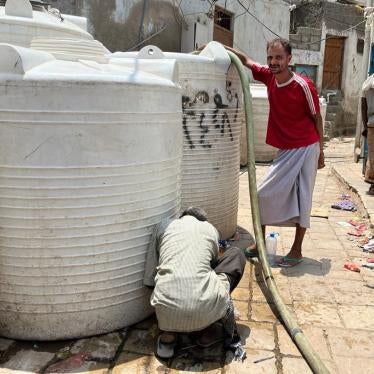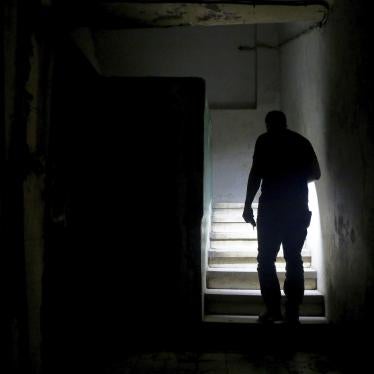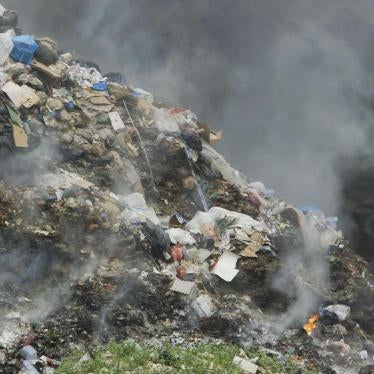- Houthi and Yemeni government forces have violated Taizz residents’ right to water since the Houthis laid siege on Taizz city in 2015, creating a desperate situation.
- The divided control over the governorate between the Houthis and the Yemeni government is critical to current water problems in Taizz.
- Both sides, in consultation with community leaders, should allow Taizz’s local water agency to access, repair, and operate water infrastructure on the front lines and in Houthi-controlled territory.
(Beirut) – Houthi and Yemeni government forces have violated the rights of Taizz residents to water since the Houthis laid siege on Taizz city in 2015, creating a desperate situation, Human Rights Watch said in a report released today.
The 45-page report, “‘Death is More Merciful Than This Life’: Houthi and Yemeni Government Violations of the Right to Water in Taizz,” found that parties to the conflict in Yemen have significantly exacerbated the area’s water crisis. The Houthis have weaponized water in Taizz by blocking water from flowing into Yemeni government-controlled Taizz city, while Yemeni government-affiliated military forces have previously sold public water supplies to residents for their own profit.
“Residents of Taizz have been suffering for the last eight years, as parties to the conflict have made it nearly impossible for them to access clean, affordable water,” said Niku Jafarnia, Yemen and Bahrain researcher at Human Rights Watch. “Water should not be used as a weapon of war, and the Houthis and the Yemeni government should take immediate action to allow more water to enter the public water network.”
Both sides, in consultation with community leaders and local civil society, should take immediate actions to allow the Taizz Local Water and Sanitation Corporation and nongovernmental organizations to access, repair, and operate water infrastructure on the conflict’s front lines and in Houthi-controlled territory.
Human Rights Watch interviewed 25 people between May and September 2023, including Taizz civilians; representatives of the Taizz Local Water and Sanitation Corporation (TLWSC), which manages and maintains Taizz’s urban water supply and sewage treatment; Yemeni civil society organizations; international nongovernmental organizations; and United Nations agencies.
Human Rights Watch also reviewed and analyzed documents provided by the water agency and by the UN Water, Sanitation, and Hygiene cluster, as well as dozens of reports and assessments detailing Taizz’s water availability and access to water both before and after the start of the conflict.
On November 2, 2023, Human Rights Watch wrote to the Houthi authorities and the Yemeni government about its findings. Houthi authorities replied on November 20, rejecting Human Rights Watch’s findings and stating that they were biased.
Yemen is one of the most water-scarce countries in the world. The UN has found that 15.3 million Yemenis—more than half the population—do not have access to sufficient, safe, and acceptable water for personal and domestic uses, including drinking, cooking, and sanitation.
Taizz, a governorate in western Yemen that long has been on the conflict front lines, has historically struggled to provide adequate water for its residents, but the percentage of the population with access to safe and sufficient water has plummeted during the war. Many of the water sources, facilities, and services that Taizz residents previously relied on are inoperable due to war-inflicted damage, salinization issues, or continuous electricity outages due to a lack of fuel that causes water pumps to cease functioning.
Only 21 of 88 of the wells linked with Taizz’s public water supply network are operational. Residents rely on the very limited water that still enters the public water network, rainwater harvesting, water provided by nongovernmental groups, and/or water that they purchase from water trucks or from private wells.
The divided control over the governorate between the Houthis and the Yemeni government is critical to current water problems in Taizz. Four out of five Taizz basins are under Houthi control or on the front lines of the conflict, making them inaccessible to the Taizz water agency. But the majority of the population lives in Taizz city, the capital of the governorate, which is under Yemeni government control.
The Houthis have blocked water in the two basins under their control from flowing into government-controlled Taizz city, despite clear knowledge that Taizz city residents rely on water from these basins. The Houthis have also continued to block and restrict access to water as part of their siege on the city, impeding the entry of water trucks, which many people in Taizz who are not connected to the public water network have long relied on.
Yemeni government-affiliated military forces, earlier in the war, took control over several wells in Taizz city’s only basin, and have sold public water supplies to residents for their own profit. Saudi and UAE-led coalition forces, intervening on behalf of the government during the Yemen conflict, have conducted airstrikes on water infrastructure, including water tanks, pumping stations, pipelines, and other vital infrastructure throughout the country, including in Taizz.
The expensive water from private water tanks and water trucks, and water donations from nongovernmental groups can only address a fraction of the population’s water needs, residents said. An internally displaced person living in Taizz told Human Rights Watch: “I don’t have a tank, I’m not able to afford its cost. My income isn’t enough even to cover my family's needs. My only dream is to buy a 1,000-liter tank to fill with water and forget this daily suffering.”
The shortage of safe and sufficient drinking water, and lack of adequate sanitation has also contributed to the spread of water-borne illnesses and disease, such as a 2017 cholera outbreak in Taizz that killed over 2,000 people.
All warring parties should take immediate steps to improve access to water in the governorate, including coordinating, where necessary, to address all residents’ short- and long-term water needs. Local officials should also coordinate with civil society and water experts to establish a plan for the development of sustainable water management practices.
Parties to the conflict should also provide reparations to the many people who have been directly harmed by their serious violations of international humanitarian law and gross violations of international human rights law, including where those violations have affected access to water. Warring parties should immediately cooperate with, support, and repair damaged and inoperable water infrastructure vital for the residents’ right to water.
“The right to water is one of the most essential components of the right to life,” Jafarnia said. “The warring parties urgently need to put an end to the Taizz water crisis and take steps to ensure that its water infrastructure is sustainable for the future.”
